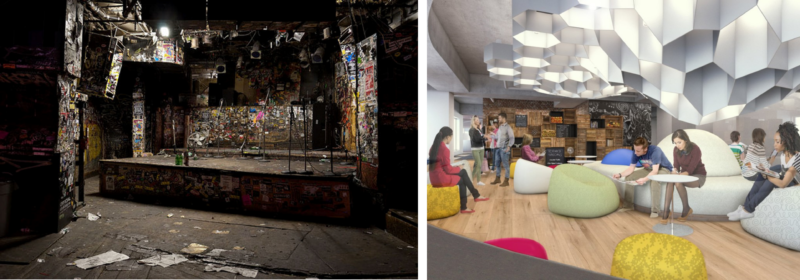
A question from a prospective new client prompted me to remember the time I was at a music conference. I think it was 2017 and one of the authors of the newly minted Leeds Culture Strategy was extolling the virtues of creating an ‘innovation-friendly’ environment. I like innovation and therefore I like the idea of innovation-friendly. Then the speaker mentioned that they were using Austin, Texas as the model for what innovation-friendly meant. At the end of the presentation, I asked what musical innovation had emerged from Austin in the last ten years. The speaker looked at me as if I was from another planet (Bradford). The best he could come up with was the SXSW festival, but essentially, there was no sensible answer to my question. The reason being that what’s happened in Austin is what happens when most organisations decide they want to nurture an ‘innovation culture’ inside their business. Or city. They make the mistake of making life easy for people. SXSW is a great festival – one of the best nights of my life was talking to one of the organisers on an overnight flight back to London – but it has nothing at all to do with innovation. Rather, it is a place for self-congratulatory industry big-wigs to drink champagne while watching a bunch of pre-selected, up-and-coming, fit-the-formula bands and musicians perform for them. This is the Austin version of building an ‘Innovation Lab’. The sort filled with bean-bags, chocolate fountains, motivational posters, Gantt charts and high tech digital voting pads for times when the senior management team turn up for a handkerchief-waving state visit.
To the best of my knowledge, with respect to my Texan friends, nothing musically innovative has emerged from Austin ever. And certainly not since SXSW or Austin City Limits arrived on the scene. I hear the their offended shouts of Stevie Ray Vaughan. Definitely innovative, and definitely connected to Austin, but the innovation happened way before Austin became his adopted city. The innovation happened, I propose, after his birth in Dallas during the early years when his family moved around the South (Arkansas Louisiana Oklahoma and Mississippi) as his asbestos-worker father rattled from one crappy, poorly-paying job to the next.
Let’s not go too far down the rabbit hole. The point is that looking to create an innovation friendly environment by modelling yourself after an environment that is demonstrably the precise opposite is probably not going to go well.
In their heart of hearts, I think the L**ds Culture Strategy guru knew this. I think he knew that, if you look at all the places where musical innovation has actually happened, the only common factor is that they have always been shit-holes. The left-hand photo at the head of this post is the interior of CBGBs in the New York Bowery district. In the mid-1970s it was a piss-stained, vomit-soaked broken-bottle rat-hole dive, constantly half a step away being condemned. But it was also the crucible that spawned generation-defining artists like Patti Smith, Television, The Ramones, Talking Heads and Blondie. CBGBs was by all accounts of the time a health hazard. 1970s New York wasn’t much better. It was the time of near-bankruptcy, crime through the roof, garbage in the streets, drugs, prostitution and no way out. Only an idiot would chose to live there. Enter the poor idiots. The starving artists that couldn’t afford to live anywhere else. The people willing to live in derelict squats to pursue their art. Creative under-resourced people living amongst other creative, under-resourced people. A literal crucible for innovation.
At this point, we might feel some sympathy for the L**ds Culture Strategy guru. No-one in their right mind is going to go to the Local Government to ask them to turn the city into a shit-hole in order to help create an actual innovation friendly environment. For a start, if that’s what you ask for, you’re not going to be given large wads of cash to help make it happen. No possibility there for fully expensed fact-finding visits to Austin. Or music innovation conferences for that matter. No budget for converting old industrial buildings and filling them with bean-bags and chocolate fountains. Nothing pretty for the suits to come and admire.
Strangely enough, the Leeds music scene hasn’t produced anything innovative since 2017. Except maybe the Brudenell Social Club, which, loathed as I am to complement anything associated with L**ds, has become one of the best music venues in the country. Funnily enough, it is located in one of the worst parts of the city, and has stayed completely separate from the Culture Strategy. Brudenell kind of gets it.
I’m provoked to mention this subject at all, because now we’re all expected to go back to the office following the Covid-19 pandemic, we’re starting to get enquiries – like the one that provoked my memory of L**ds and Austin – usually from HR people, asking for advice on how to design and create innovation-friendly labs. I haven’t quite resorted to showing them photos of the inside of CBGBs, but I’m getting close. A deliberately created shit-hole is probably going to be as ineffective as the previously mentioned bean-bag filled labs. Or some of the other things you’ll find in the depressingly tragic cookie-cutter winners of the ‘Best Innovation Labs’ 2023 award winners exhibited at https://gfmag.com/features/best-innovation-labs-2023/. The only guarantee with all of them is they will produce zero innovation. Definitive unnovation.
The real job is to define and manage another of our Goldilocks Curves:

Innovation doesn’t happen by smoothing the road for the team. It happens best when things are made just hard enough that it provokes the optimum amount of grit, persistence and rule-breaking bloody-mindedness. Successful innovation labs don’t get called ‘Skunkworks’ or ‘Pirate’s Cove’ or ‘Cockroach Corner’ for nothing. Make life the right amount of difficult and then keep (Red World) management the fuck away and leave the skunks, pirates and cockroaches to get on with doing what they do best.
“The bottom line on culture and grit is: If you want to be grittier, find a gritty culture and join it. If you’re a leader, and you want the people in your organisation to be grittier, create a gritty culture.”
Angela Duckworth
